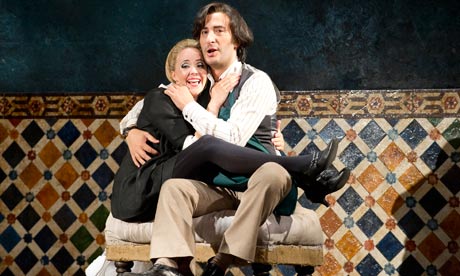
Le Nozze di Figaro may be Glyndebourne's signature work, but it is 12 years since the last new production of Mozart's social satire was unveiled there. That version, which closed a Da Ponte trilogy by departing director of productions Graham Vick, was set in an indeterminate though more or less present-day world; Michael Grandage's new staging is an updating, too, but one that Christopher Oram's handsome designs make much easier to pin down.
The grand exterior complete with Moorish arch on which the curtain rises during the overture instantly locates the action somewhere in Andalucia, presumably at Da Ponte's original Aguafrescas, the Almaviva estate outside Seville. The costumes, not to mention the snazzy sports car in which the Count and Countess drive up, pin it down to the late 1960s. This is Spain in the final, decrepit years of the Franco regime, when the last vestiges of the old order still cling on.
Oram's sets are increasingly expansive and sumptuous as the opera unfolds – Figaro and Susanna's wedding ceremony takes place in a gorgeously decorated chamber; the garden of the final act seems bordered by a cloister – but Grandage's treatment of the characters inhabiting them is surprisingly neutral. Having opened up the possibility of finding new perspectives on the work's social and sexual politics, he then pulls back: the fault lines in the class structure of the Almaviva household aren't defined, and there's no sense that a seismic shift in Spanish society is just around the corner.
With some directorial tweaking everything could snap into focus, and the comedy might then acquire a more convincing edge. That might have to wait for a revival, though; on the first night it was all very pleasant but just a bit bland: neither sexy nor dark enough. Audun Iversen's Count is more of a blusterer than a predator, Vito Priante's Figaro less subversive than he ought to be, his relationship with Lydia Teuscher's Susanna already a bit too cosily domestic. Much of Sally Matthews's singing as the Countess was a consonant-free zone, and the recitative never went with the snappy conversational urgency it really needs – the leaden, approximate surtitles don't help either.
The best performances come from Marcellina (Ann Murray), dowdy Bartolo (Andrew Shore) and louche Basilio (Alan Oke), three feisty characters in search of a real drama to get their teeth into. In the circumstances, it's a shame both Marcellina's and Basilio's arias are omitted. Isabel Leonard's Cherubino could be special, too; her arias were real highlights, though she is never given anything very memorable to do on stage. It's all just a bit subdued; even the beautiful playing by the Orchestra of the Age of Enlightenment lacks presence, as if waiting for conductor Robin Ticciati to give the performance the kick start that never really comes.
• This production will be streamed live at guardian.co.uk/glyndebourne on 17 August.

